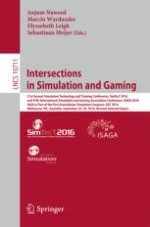2018 | OriginalPaper | Buchkapitel
Pitfalls for Debriefing Games and Simulations: Theory and Practice
verfasst von : Bill Roungas, Marieke de Wijse, Sebastiaan Meijer, Alexander Verbraeck
Erschienen in: Intersections in Simulation and Gaming
Aktivieren Sie unsere intelligente Suche, um passende Fachinhalte oder Patente zu finden.
Wählen Sie Textabschnitte aus um mit Künstlicher Intelligenz passenden Patente zu finden. powered by
Markieren Sie Textabschnitte, um KI-gestützt weitere passende Inhalte zu finden. powered by
